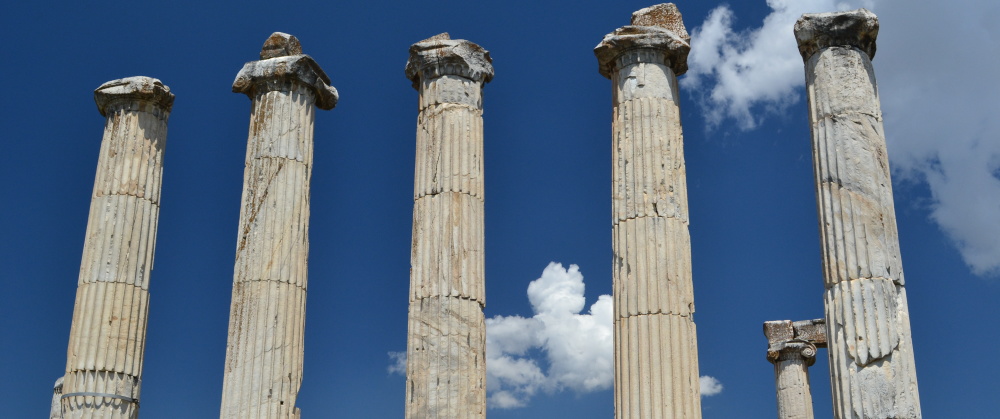One of the many ways in which the grassroots phenomenon of emperor worship manifested itself in the Roman world was the incorporation of the emperor into the sacred spaces of the Roman world. This inclusion of a living ruler into temples of the gods is predicated upon the manner in which the denizens of the Roman world treated their deities. Since the gods of civic religion were the first citizens of the city, it was only natural for the gods, like the other citizens of the city, to dwell together. As a result, Plutarch (Quaest. conv. 7.6) says that people frequently not only pray to the deity for whom the temple, altar, or shrine was constructed but also they petition the gods who were sharing that particular sacred space with said deity. Consequently, this incorporation of the emperor into the sacred space is evidence to the extent that the denizens treated the emperor as a god and thus believed the living ruler to be divine.
For example, on the Greek island of Cyprus a sanctuary of the island’s patron goddess Aphrodite was re-dedicated in 79/80 CE to include the worship of the living emperor Titus:
Αὐτοκράτορι Τίτωι
Καίσαρι Οὐεσπασιανῷ
Σεβαστῷ καὶ Ἀφροδείτηι
Τόπον ἱερὸν ἀπο-
κατέστησεν τὸν ἐν-
τὸς τῶν στηλῶν
ὄντα Λούκιος Βρούττιος
Μάξιμος ἀνθύματος
ἔτους δευτέρου
“To Imperator Titus Caesar Vespasianus and to the great goddess of Cyprus Aphrodite. In the second year, Lucius Bruttius Maximus, proconsul, restored [this] sacred place confined by the steles” (Amathous no. 3).
From this inscriptions a few observations are evident. First, the emperor was worshipped alongside of the patron goddess of Cyprus. While there may have been a hierarchy in the temple with placement of the cult images of Titus and Aphrodite and Aphrodite may have remained (and probably did remain) the chief deity of the temple, that the emperor was included in the inscription in the same manner as Aphrodite (both Aphrodite’s and Titus’s names are in the dative case) indicates that Titus is in an exalted position and was probably given the same honors as Aphrodite. Thus the living Titus was treated as a god and in the same manner as Aphrodite. Second, although Titus was treated as a god, he is not called one in the inscription. It is possible that since the dedicator is a high-ranking Roman official he has followed Roman protocol and intentionally not referred to the living Titus as a god (cf. Cassius Dio, Rom. Hist. 51.20.6-8). Third, contrary to the manner in which many NT scholars interpret emperor worship, this honor given to the emperor was at the behest of Lucius Bruttius Maximus and not the emperor Titus. Therefore this is evidence of the political, religious, and monetary allegiance that people within the Roman empire gave to the emperor.
